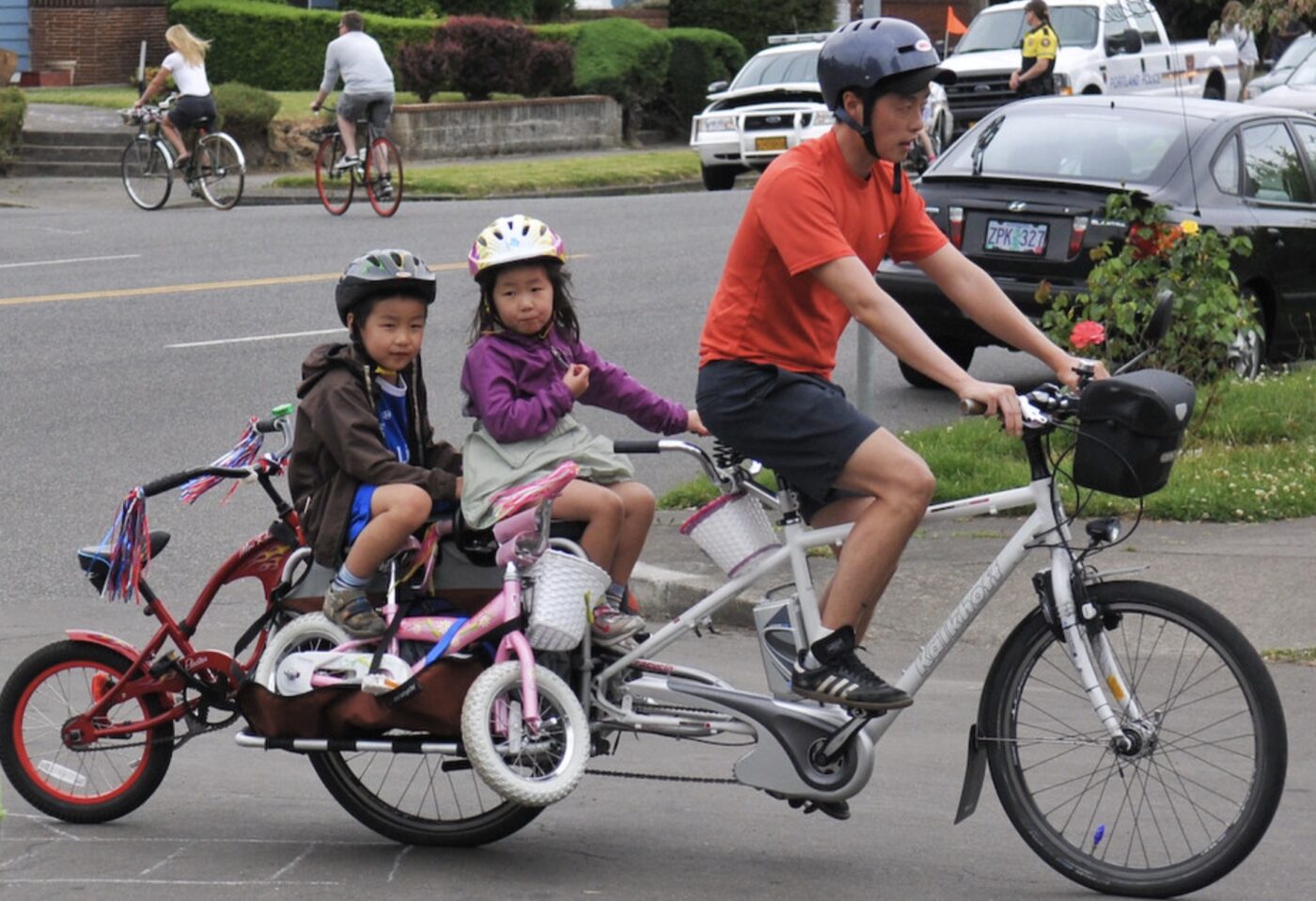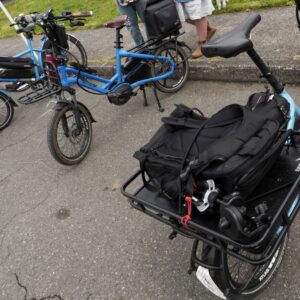
There might be a few cases of transportation funding whiplash at Portland City Council today. After the grim reality of the city’s transportation budget was laid bare during a work session Tuesday, today Mayor Ted Wheeler and the rest of Council are expected to adopt the five-year $750 million Portland Clean Energy Community Benefits Fund (PCEF) Climate Investment Plan (CIP) — and the $80 million it includes for transportation programs, projects, and grants.
The two headline investments for transportation are a $20 million e-bike rebate program and a $25 million boost to the Portland Bureau of Transportation’s existing Transportation Wallet program. PCEF’s plan estimates up to 6,000 e-bikes could be purchased through the rebate program and that 20,000 low-income Portlanders will get free BikeTown, e-scooter, Uber/Lyft, taxi, and TriMet service through the wallet program.
PCEF, which uses taxes on corporations to fund projects and programs that aim to help low-income and communities of color to battle the impacts of climate change, was passed by Portland voters in 2018. When the fund’s first projects were chosen in 2021 (and the fund’s value was much smaller), none of them were transportation-related. That has changed, big-time. 17% of the current PCEF investment plan is set aside specifically for transportation programs and grants, making it the second largest funding category. When you take other parts of the plan into consideration, like funding to plant trees on 82nd that will likely come with wider sidewalks, funding for tree canopy expansions, depaving, and so on, the total climbs to over 20%.
According to PCEF Committee members Maria Sipin and Megan Horst, the new priority on transportation is a result of the fund’s growth. “Excluding transportation didn’t mean the architects of PCEF didn’t believe in the needs of communities of color around transportation,” Sipin shared during an interview with BikePortland this week. “It’s because there was a huge lack of investment that would directly benefit communities of color in the clean energy space.” And Horst added, “The concern back when the fund was expected to be $60 million a year was that that wouldn’t actually go very far for transportation.”
But that was then, and this is now. In addition to those aforementioned set-aside funding programs, PCEF will fund exciting initiatives we don’t even know about yet through its “community responsive grant” program.
The origin story of PCEF and the values at is foundation make it much different than other large funding and grant-making bodies. While it will be managed by the Portland Bureau of Planning & Sustainability (BPS), Sipin, a community advocate with a graduate degree in planning from Portland State University and a resume that includes stints at the Oregon Department of Transportation and the Safe Routes to School National Partnership, says it stands apart. “There’s a lot room here where community-based organizations can pitch their big, bright ideas to get these grants. PCEF allows regular Portlanders to dream up solutions that don’t fit in any other spaces.”
Sipin is referring to the $181 million in community grants in the PCEF CIP — $35 million of which are set aside specifically for transportation.
For Portlanders with lower incomes, the dream of owning an e-bike has always been out-of-reach. Since many people move further away from jobs, family, and other destinations to find cheaper housing — and their new neighborhoods are often not as well-served by transit — having a motorized bike that can shrink the city can be an invaluable addition to their lives.
The e-bike rebate program is slated to launch in Spring 2024 and will be fleshed out in the coming months through a public process handled by BPS. What we know so far is that qualified participants will be able to walk into their closest bike shop and get an instant rebate on the e-bike of their choice. And PCEF envisions a comprehensive program that won’t end with the bike purchase. Funds are available for helmets, locks, and other accessories, as well as ongoing maintenance. And the bike shops themselves will receive funding to do education, host group bike rides, and so on. With $600,000 in the plan for workforce development and retention grants, PCEF estimates shops could hire up to 50 new e-bike mechanics to keep the bikes running.
To further boost the e-bike rebate program, Horst, an associate professor and director of the Masters of Urban and Regional Planning program at PSU, said PCEF would love to see a nonprofit apply for a grant to lead rides or do advocacy connected directly to these new e-bike riders.
But Sipin warns that just because a new crop of Portlanders can suddenly hop on quality e-bikes, and there will be wrap-around services to help them along, it doesn’t mean they’ll keep riding. “I think the e-bike program is just the very beginning of getting more people on bikes and decreasing the barriers to biking. It’s not going to be the magic solution that increases our bike mode shift in the city. If we don’t have safe, secure, accessible bike parking, e-bike use will only go so far. We also have a street network that is still way behind getting built out to what it would take to improve access and safety.”
Sipin is hopeful that BPS will work closely with PBOT and that advocates will see the PCEF investments as an opportunity to push for better conditions. “We know the Bureau of Planning & Sustainability is not the bureau that builds the infrastructure. We are waiting to see what the relationship between these two bureaus are… and I count on a lot of Portlanders to be vocal about the ways they’d like to see the e-bike program grow in terms of infrastructure that could complement this growth in e-bike usage.”
Sipin sees a large role for engaged advocates over the next five years as the CIP rolls out. We’re already seeing how City Council members are eyeing the fund as a way to backfill budget holes. That’s a big concern around the PCEF table. City bureaus are eligible to request grant funds, but they’ll have to adhere to PCEF values when they spend them.
“PCEF has persisting, everlasting, guiding principles which are justice-driven, accountable, community powered, and focused on climate action with multiple benefits,” Sipin said when asked about the prospect of city bureaus using PCEF funds. “People don’t always feel like their bureaus are acting in accordance to those types of principles already. So for bureaus to be transparent and accountable on how the funds are used… I think that could be a tall order for any bureaus who haven’t demonstrated that.”
“When we make clean transportation affordable, it is an anti-poverty strategy as much as it is a climate strategy.”
– Indi NamKoong, Verde
Horst agreed letting city bureaus in on the funding has caused some heartburn. “Backfilling PBOT budget holes for something like filling in potholes? I empathize with that problem, but we’re very clear that that’s not the mission of PCEF,” she said.
At its core, PCEF is about bringing climate change mitigation investments directly to the people. Horst said infrastructure is one thing, but there’s a need for helping people change behaviors — and more specifically — incentivizing more climate-friendly ones. “I think that’s exactly what these programs are doing. We’re giving people money to mode shift. We’re making the green choice, the cheaper choice. To me that’s super exciting.”
That approach rings true for Indi Namkoong, who sold her car last year after getting an e-bike.
“When we make clean transportation affordable, it is an anti-poverty strategy as much as it is a climate strategy,” she said in City Council testimony in support of the PCEF CIP last week. “Transportation is the second largest expense for most households in Portland just behind housing. These transportation programs will put hundreds, and in many cases, thousands of dollars directly back in the pockets of low-income people and people of color in our city every year. And that money can be life-changing. I know personally, it was for me. When my rent increased substantially last year it was good transit access and an e-bike that made it feasible for me to sell my car. I saved hundreds of dollars a month on payments and insurance and I was able to hang on to my apartment and stay in my neighborhood.”







Thanks for reading.
BikePortland has served this community with independent community journalism since 2005. We rely on subscriptions from readers like you to survive. Your financial support is vital in keeping this valuable resource alive and well.
Please subscribe today to strengthen and expand our work.
Would it be possible to reduce the price of Biketown shared e-bike trips and increase the supply of shared e-bikes? For example, anyone who has a low-income, student, or senior Trimet pass could get 2 free 30 minute Biketown e-bike rides per day, and 1/2 cost on additional rides. There is currently unmet demand for Biketown and reducing the cost would mean that many additional bikes are needed, but paying for more bikes would still only cost a small fraction of this program, and the additional availability and visibility would also increase the number of people taking unsubsidized Biketown trips.
https://biketownpdx.com/pricing/biketown-for-all
already exists for that.
That said there are still parts of Portland that aren’t covered including some popular biking destination like the Springwater corridor trail 🙁
We desperately need tax reform. We have so many random taxes that do random things, while the city and county can’t meet basic obligations like keeping the city clean.
E-bikes are not going to move the climate change needle any more E-cars. If you truly want to help people get out poverty, you need to build high quality public transportation.
PCEF and other similar, inefficient taxes are a critical funding slush fund for our revolving door of city workers and the non-profits they work closely with, and often times for. How would these questionable non-profits stay afloat otherwise?
https://www.oregonlive.com/environment/2023/09/will-massive-clean-energy-fund-take-portland-to-its-climate-goal-no-and-thats-not-its-objective.html
Well, well, well.
https://www.opb.org/news/article/portland-clean-energy-measure-costs/
Looks like the opponents were correct.
80 million dollars for bikes yet they’re hemorrhaging money as they force automobiles out of the metro and make it harder for people who had to move out to afford rent/mortgaged to get to where the jobs are. Its like they want to destroy the state’s economy
Hi Bill. This isn’t PBOT money. It has nothing to do with PBOT other than it is giving money to them. The money is raised through a corporate tax that a majority of Portlanders voted for. Also, no one is forcing drivers out. If anything, our system forces people into cars because it’s the only way to survive and arrive on time.
It is public money, so they have a responsibility to spend it wisely. I hope they do a good job tracking and reporting how effective this tactic is at displacing auto trips. If it works, it could be a cheap way to get people of their cars.
Isn’t the point of the new city charter that instead of being organized by bureaus, run by separate elected managers, that the city will be run by a unified management and be responsive to various geographic neighborhood desires? No more turf wars between BPS and PBOT. Maybe some neighborhoods would prioritize ebikes while others would care more about heat pumps or floodplains or toxic waste.
What is their incentive to be responsive? The new structure will insulate the bureaus from political “interference”; if a council member wants a bureau to do something, they’ve got to find 6 other councilors who agree and are willing to sign on to a resolution directing the bureau to act.
And if you think turf wars will end, you obviously haven’t spent much time around bureaucracies.
Our current system is flawed, but it can be responsive.
Most cities with city managers still have turf wars, but they become internal rather than external (in the public eye.) You’ll still have bureaus – they may get termed as departments but it’s still the same basic structure. The city manager won’t be able to hire/fire employees any more easily that the mayor can now. In fact, the only difference you’ll actually see is that the city manager will be appointed by council instead of directly elected as they are now (i.e. the mayor) – a net reduction in democracy. All the problems you have now won’t change one iota.
The currently proposed structure would have five sub administrators each in charge of a portfolio of bureaus. That sounds very similar to what we have today, and I can’t imagine there would not be political turf wars between those sub administrators just as we have today.
I’m hopeful having less turnover at the top of these bureaus will create more consistency in their directions/planning etc. The Mapps/Williams Broadway snafu is a good example of the problem of having a new politician head a bureaucracy every few years.